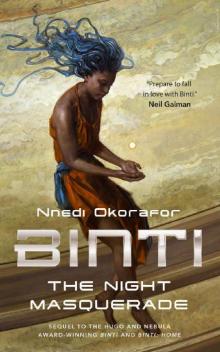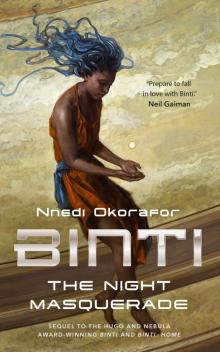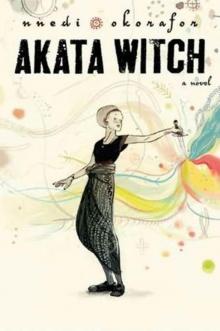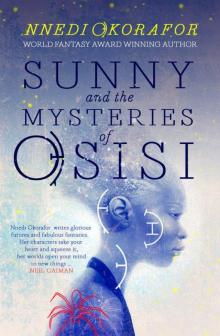- Home
- Nnedi Okorafor
Ikenga Page 15
Ikenga Read online
Page 15
“Chief?” Nnamdi said to himself. “But the Chief of Chiefs didn’t do it.” He paused and then the thought bloomed in his mind like the answer to a math problem he’d been stuck on. “Oh!” he said. He shoved the towel untidily on the rack and dashed out of the bathroom. He threw on some shorts, a shirt, and some shoes, and for the second time in twenty-four hours set off running along the side of the street.
He knew who it was now. The one who killed his father was none other than the one man who took the most and the biggest bribes in Kaleria. He liked to appear on television and talk tough. He was a showman. He pretended to fight crime but he was corrupt. He’d even been at the Chief of Chiefs’ party, dancing like a beer-soaked monkey. His father’s successor. And he was a chief! The new chief of police! Chief Ojini Okimba.
Slowly, he stopped running. The police station was a ten-minute walk from his house. Unless he took a kabu kabu—he had enough money for one of those. He could change into the Man and make it in less than half the time, but it was broad daylight and thus too risky. He paused, considering everything as people around him enjoyed their Saturday. The afternoon was cool with a nice breeze. Kaleria was a good place to live, if only there were no criminals as well as a new police chief who protected criminals.
Chief Ojini Okimba’s activities during his father’s burial flashed through Nnamdi’s mind as he walked to the street. He remembered Okimba’s speech at his father’s funeral, where he’d practically blamed his father for getting shot. Okimba had said, “In his next life, such a fine police officer will know better.” Nnamdi shivered with anger at the memory. He held up a hand to hail a kabu kabu. What kind of man says that in a speech at a police chief’s funeral? he wondered.
A kabu kabu slowed in front of him, but Nnamdi was still deep in thought. He had never heard of Okimba before he became the new chief of police, so he had no idea what his relationship had been like with his father. However, it was clear to Nnamdi that Okimba had had good reason to kill his father. Chief Okimba was known for taking bribes and dabbling in corruption; now he was living the good life with Nnamdi’s father out of the way. Once Nnamdi got to the police station, he would force Okimba into a jail cell, lock him up, and escape with the keys. And if he refused arrest, he would deal with him. The Man already had a bad reputation; people expected him to behave that way. And they would never find and arrest Nnamdi, because he was the Man.
As he reached for the kabu kabu’s rusty door handle, he felt his hands go clammy. He was being as irrational as he had been when he’d gotten stuck as the Man in the abandoned school. Hadn’t he learned his lesson about what happens when you let anger cloud your mind? This wasn’t the way to do it. Maybe I should wait until night, he thought.
Irritated, the kabu kabu driver cranked opened his cracked window and shouted, “Wetin come be dis kin nonsense? Why u mek me stop if you no dey go?” He angrily drove off, leaving Nnamdi in a wake of dust.
* * *
That night his mother and Mr. Bonny decided to go out to a restaurant. Mr. Oke also happened to be off duty. It was the first time Nnamdi was allowed to stay home alone. What perfect timing, he thought.
“I’ll be fine,” Nnamdi said as they left.
“You know where the mobile phone is?” his mother asked.
“Yes, Mommy.”
“I’ll call when we get to the restaurant,” she said.
“No need,” he said. “Send a text and I’ll text you back.”
Mr. Bonny laughed. “Let him be a man, Ezinne.”
Nnamdi’s mother kissed him on the cheek and went outside. Bonny took him aside. “You sure you’re okay with this?” he asked. “After the kidnapping and all?”
Nnamdi nodded.
“You’re the son of a police chief, so you know more than anyone what’s out there.”
In that moment, Nnamdi truly began to like Bonny.
“If you want to come with us, that would be just fine. I’ll tell your mother that I insisted,” he said.
“Thanks, Mr. Bonny,” Nnamdi said. “But I can do this. Really.”
Bonny nodded and smiled. “I know you can.” He patted Nnamdi on the shoulder. “And I’m glad you didn’t take me up on my offer. You’re a good kid, Nnamdi.”
“Thanks, Mr. Bonny.”
As soon as they were gone, Nnamdi ran into the night. It was a seven-mile run and a warm night, but as the Man, Nnamdi felt invincible and the heat brought not a drop of sweat to his shadowy body. He could run nearly as fast as the cars and, in the darkness of the night, no one could see him. He ran past the akara lady. He passed the closed market. Finally, he arrived at the police station.
He stopped at the steps that led up. He hadn’t been here since before his father died. He and his mother used to stop by to see him when he worked late. They’d bring him dinner. His office was full of stacks of paper and his telephone was always ringing. He kept a photo of his garden on the wall beside the framed image of the Nigerian flag and map of Kaleria. But it’s not Daddy’s office anymore, Nnamdi thought. And right now, he wasn’t Nnamdi, he was the Man.
He walked up the steps. He knew exactly where the office for the police chief was located. And he knew that the police chief usually worked late nights. Nnamdi also knew that the department building would be near empty.
He was barely at the front door when it opened and a tall woman in the tightest jeans Nnamdi had ever seen and an even tighter red blouse came out of the building. She wore super-high platform pumps with what looked like diamonds in the heels. Nnamdi only noticed this because they sparkled in the building’s bright lights.
“Good evening, shadow man,” she said to him in a smooth, buttery voice, without so much as a glance his way. She chuckled throatily as she quickly walked down the stairs.
“Good evening,” Nnamdi said in his gruff voice. She was gone before he could worry about her noticing that he was more shadow than human being. How could she move that quickly down all those stairs in those shoes? he wondered. Still, he was glad she was gone. He went inside.
To Nnamdi’s relief, the building was empty. He ran down the hall, straight to the police chief’s office. The light was on. The chief was in. Nnamdi took a deep breath. His mind was getting cloudy. He was seeing his father behind those doors. Alive. Less than a year and a half ago. Before the man who was now behind the door had had him killed or done it himself. Taken his father from him. He shuddered, thinking about the pain his father must have felt when he was shot, the loss as his life drained away from his chest and neck.
“I’ll get him, Daddy,” he said to himself. “I promise you.” His voice was like thunder.
When he grasped the doorknob, Nnamdi was full of damage. He tore the brass knob out and kicked the door in. “GET READY TO DIE! YOU . . .”
There was no scream of fright. There was nothing. Nothing but . . . Nnamdi frowned and fought with himself to relax. The ringing in his head slowly died down. The throb of his heartbeat in his ears decreased. Silence. He listened. Someone was breathing. Loudly. Snoring?
He glanced around the office. The walls were bare, the pictures his father kept on the wall gone, leaving dark outlines where they’d been. Okimba had barely moved in nor had he had the place cleaned up. The desk was heavy with stacks of papers, with several more stacks on the floor. Nnamdi frowned. The snoring was coming from behind the desk. He peeked over it and nearly cried out.
There was the new chief of police, Chief Ojini Okimba, sitting on a chair, fast asleep, with the word Rubbish written on his forehead in red lipstick. Nnamdi had kicked the door down and shouted and Okimba hadn’t woken. His head was back and his mouth was wide-open as he loudly snored. His arms and legs were tied together with strong red rope. A note was taped to his chest.
“What the—” Nnamdi couldn’t believe his eyes. “Chief Okimba!” he shouted.
The chief twitched and sluggishly opene
d his eyes. When he saw Nnamdi, his eyes grew wide and he screamed. Then he tried to bounce himself away, nearly capsizing the chair. “Blease! Ah, ah. Don’ ’urt me, o!” he said, slurring his words. “Sh’ took ever’ting!”
“Who?” Nnamdi shouted. “What happened here?!”
Okimba shut his eyes and shook his head. Then it seemed to dawn on him. “Are you the Man?”
“What happened here?” Nnamdi demanded.
Okimba seemed to become more alert as Nnamdi spoke. He started to talk. “‘You’re the chief of police,’ she said. ‘You should be kind enough to help me,’ she said.”
“What are you talking about?”
“I’m not even usually here late like this,” he said hysterically. “I have a life, a family.”
Nnamdi kissed his teeth.
“She stopped me as I was going to my car,” Okimba continued. “That woman. Okay, so yes, she happened to be quite beautiful . . . but that wasn’t why I tried to help her.”
Nnamdi rolled his eyes. What a liar. Obviously, the woman being beautiful was the reason Okimba had paid any attention to her.
“She said she had no money to get home and buy food,” Okimba continued. “She was appealing to my sense of decency, you see. I brought her here to . . . get her some cash.”
Then Nnamdi understood. The chief of police had just been robbed. He blinked again, realizing more. He’d been robbed by the woman Nnamdi had seen coming out of the station minutes ago!
“She called herself Darling,” Okimba said. “She must have put a sweetie in my beer that made me sleep.”
“Why were you drinking beer with her?” Nnamdi asked. “In your office?”
“What does that matter? She took everything I had! My watch, my wedding ring. She sat here on my computer and transferred all the money in my bank accounts to some other account! Oh my God, I am ruined, o! God is punishing me, o!”
Nnamdi reached forward and plucked the note from his chest. He read it out loud: “I am Darling, but I am also fearless! See what I did to the chief of police! HA!”
“Oh God of Abraham,” Okimba moaned. “Who wants to be a victim to something like this?! I’ll be the laughingstock of Kaleria. I didn’t even want the position of chief of police. No one else would step up after Egbuche Icheteka was shot.”
Nnamdi froze. “You didn’t want to be the chief of police?”
“Of course not!” he said. He cocked his head. “Do . . . do you? Would you like to have the job? It doesn’t pay well but it pays.” He looked away. “No, you don’t like the law, do you? What . . . what are you anyway? A ghost? Spirit? Demon?”
Nnamdi blinked, processing Okimba’s words. Okimba wasn’t the murderer either. It was time to go. “What am I?” Nnamdi asked, trying to sound as scary as possible. “I am always watching you. So do your job. My fa—Chief Icheteka would never have allowed something like this to happen.”
“At least untie me, before you leave.”
Nnamdi turned away. “I’ll send you help.”
“No, untie me now! You think I want anyone finding me like this? You leave me here . . . and I will tell everyone that it was you who robbed me. There are cameras on the building that will have shown you entering!”
Nnamdi had forgotten about the camera. His father had told him the same thing. The station was monitored twenty-four hours a day with cameras. Would he show up? He didn’t know. He wasn’t sure! Maybe? Idiot, Nnamdi, idiot! He wanted to smack his head. But did it really matter so much when everyone already thought the Man was a kidnapper of children? And who was to say that Okimba would not still accuse him even if he did untie him? Nnamdi turned and left. After alerting some of the bewildered-looking night-shift officers to what was happening in the police station building, Nnamdi got out of there quickly.
* * *
In the morning, Nnamdi held his breath when he went out to get the paper. He hadn’t stopped by Chioma’s bedroom window to tell her what had happened. If the incriminating lies the chief threatened to tell were inevitable, what good would it do to discuss things with Chioma?
Now, newsletter in hand, he walked back home. He went to the back of the house and sat down in the middle of the garden. It was peaceful and quiet here, the air smelling of leaves, flowers, and soil. He’d replanted the sunflowers and vegetables. The yam may have been mashed, but the vine was at least still green and intact. Already, it was starting to shoot out a fresh pair of light green leaves at the tip. He opened the paper.
The headline read in big block letters, “ROBBED!” Right below it was a huge photo of a snoring chief of police slumped in a chair with the word Rubbish lipsticked on his forehead and a note taped to his chest as Darling stood beside him posing like a runway model. She wore a smiling masquerade mask to hide her face. Nnamdi burst out laughing and couldn’t stop for the next ten minutes.
It turned out that Nnamdi had nothing to worry about, for the criminal calling herself Darling had sent an envelope full of photos along with a copy of the letter she’d taped to the chief’s forehead. The chief was going to be so, so embarrassed when he saw the article, and the thought of this sent Nnamdi into another fit of laughter.
So Chief Okimba was innocent, too. At least of murdering my father, Nnamdi thought. He’s probably guilty of a lot of other things, like taking bribes and turning a blind eye to what certain criminals do. Nnamdi folded and refolded the newsletter. Doing this helped him focus. He put the tiny triangle of newsletter in his pocket and took a deep breath. What next? he asked himself. He went for a walk. He’d mistaken three people as murderers so far. He needed to clear his head before he made another plan or move.
It was Sunday and plenty of people were out and about, enjoying the cool sunshine. As he walked, his eyes were drawn to two women a few yards away, standing in the shade of a building . . . both quietly reading newsletters. He looked around. A lot of people were reading them. Some were even walking beside the dangerous road as they read. The guy who ran the paper, the editor, he had people’s minds in his hands with that newsletter. Nnamdi remembered the unpleasant interview he’d had with the newsletter’s editor. The man was like a vampire.
Calmly, he turned and started walking the other way. He would not need a kabu kabu. He’d rather walk in the pleasant sunshine. The Kaleria Sun’s headquarters were farther than the police station, but Nnamdi had the time and he certainly had the energy.
“Nnamdi!” Chioma said a minute later as he passed near her house. She’d just come out and was locking the door. Nnamdi smiled and waved. She joined him, hoisting up the small backpack she always carried. She was carrying a copy of the newsletter, too.
“I was just going to look for you,” she said. “I have an idea. Have you ever noticed that the newsletter . . .”
They stared at each other, the unspoken flying between them in a way it only did between true friends. They’d realized it at the same time.
“Yes,” Nnamdi finally said.
“We both go.”
“You don’t have to,” he said. “I can handle him by myself.”
“That’s what I’m afraid of,” she said knowingly. “I also was looking for you because I noticed the shadows starting to grow again.”
Nnamdi nodded but said nothing. All he wanted to do was go. No more talking.
They walked for a few minutes in silence. Chioma looked at Nnamdi. “Why don’t we take a kabu kabu or the bus?”
Nnamdi shook his head. “Trust me, the long walk is good for me.”
“Oh,” Chioma said, glancing at him. “I see. Then we walk.” She smiled nervously. “Yes, let’s walk. It’s best to go into stressful situations with . . . a cool head.”
They walked for a few more minutes, Chioma continually shooting glances at Nnamdi. Nnamdi focused on the sunshine and the warm breeze. He flared his nostrils and inhaled. As they walked, his nerves calmed. Chioma
’s presence had an additional calming effect.
* * *
The building was made of solid concrete and surrounded by a wrought-iron fence.
“Do you have any blank paper in your backpack?” he asked Chioma.
“Of course,” she said. She reached in and brought out a notebook. Nnamdi smiled.
“That’s perfect,” he said. “A pen, too?”
She handed him one. The ink was pink.
“Okay, so we are two students who write for the school newspaper. We are doing a story on the editor in chief. We think he is the best journalist on earth and our story will be about why this is so true.”
Chioma’s face lit up. “Oh! With his huge ego, he’ll have them bring us right in so we can interview him.”
“Exactly.”
The plan worked perfectly. The editor in chief, Ikenne Kenkwo, told the guard to send them right in. Within two minutes Nnamdi and Chioma were walking through the newsroom to his office. “He’s right in there,” the secretary said. He was a tall, thin man who seemed more than annoyed at having to leave his desk to escort two kids into the newsroom.
Nnamdi had never seen so many computers and desks squeezed into such a small space. The fluorescent lights were tinted an ugly yellow and there was only one window, which was near the ceiling.
“Ugh, this place smells like dirty socks,” Chioma whispered.
Nnamdi didn’t know what he’d expected, but it wasn’t this cramped newsroom. Not from a uniquely successful newsletter that thrived on embellished overblown stories and . . . murder. He knocked on the closed door on the other side of the newsroom that said, Ikenne Kenkwo, Editor in Chief.
“No changing into the Man,” Chioma quickly said. “Let’s handle this ourselves. You and me.”

 Binti, The Complete Trilogy: Binti ; Home ; The Night Masquerade
Binti, The Complete Trilogy: Binti ; Home ; The Night Masquerade Remote Control
Remote Control Binti: The Night Masquerade
Binti: The Night Masquerade Binti--The Night Masquerade
Binti--The Night Masquerade Kabu Kabu
Kabu Kabu Binti
Binti Zahrah the Windseeker
Zahrah the Windseeker Akata Witch: A Novel
Akata Witch: A Novel Ikenga
Ikenga Who Fears Death
Who Fears Death Binti--Home
Binti--Home Lagoon
Lagoon Akata Witch
Akata Witch The Book of Phoenix
The Book of Phoenix Akata Warrior
Akata Warrior Sunny and the Mysteries of Osisi
Sunny and the Mysteries of Osisi